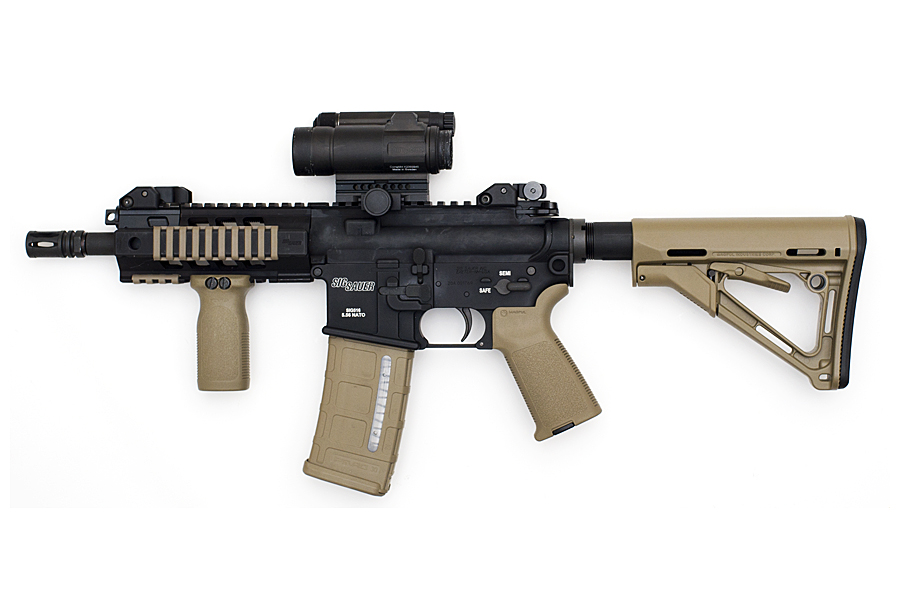 Arsenal Attorneys: A National Firm - Offices in Virginia and California
Arsenal Attorneys: A National Firm - Offices in Virginia and California
Arsenal Attorneys: A National Firm - Offices in Virginia and California
Arsenal Attorneys: A National Firm - Offices in Virginia and California
CONTACT US TODAY
800.819.0608
Displaying items by tag: gun
DC Concealed Carry Pistol License Renewal Procedures
By George L. Lyon, Jr, Esq.
Arsenal Attorneys frequently advises clients in the concealed carry of firearms, including licenses to carry in the District of Columbia by residents and nonresidents alike. After helping win the battle for these rights, I now help clients renew their carry licenses. This blog provides a summary of the license renewal procedure. But first, some history.
Two years ago, on September 28, 2017, the Federal DC Circuit Court of Appeals declined to overturn the ruling of its three-judge panel in Wrenn v. District of Columbia finding DC’s ‘may issue’ concealed carry licensing scheme unconstitutional. Since that time, DC has been a ‘shall issue’ concealed carry jurisdiction.
As a result of the court’s ruling, DC concealed carry licenses have increased from 123 in September 2017 to 3,339 as of the end of August 2019. Despite DC’s lamentations that shall issue conceal carry would threaten public safety, the record shows that DC’s concealed carry license holders have been exceedingly law abiding. Since June of 2014, when the courts first forced DC to issue concealed carry licenses, only two concealed carry licenses have been revoked for criminal violations and these were not for violent crimes, but rather for violation of one of DC’s myriad, complex weapons offenses, e.g., possessing a firearm in DC the license holder had not registered.
Nor have DC concealed license holders set off gun fights in the street. There has been just one reported shooting by a DC concealed carry license holder. It occurred when the license holder fired in self-defense when attacked by two would be robbers. No charges were filed against the licensed carrier.
Given that DC requires its concealed carry licenses to be renewed every two years and that quite a few people applied for carry licenses soon after DC went shall issue in September of 2017, we thought we would review the procedure for renewing DC carry licenses. The good news is that unlike the rather complex and time-consuming process for receiving the initial carry license, the renewal process has been greatly streamlined.
Although the initial mandatory training for the DC carry license is 16 hours of classroom instruction and two hours of range training, the renewal training requirement is just four hours of classroom training plus a two-hour range session. The renewal training requirement is mandatory and not waivable. A DC-licensed firearm instructor will provide you a certificate documenting proof of your training which you must submit with your renewal application. The Metropolitan Police Department (MPD) has a portal on its website allowing you to pay the $75 fee and submit the renewal application and training certificate online. It can be accessed at this link. If your renewal is submitted online, your renewed license will be mailed to you in about a week.
Be advised that for reasons unknown the portal is sometimes unreliable. Alternatively, you may submit the application and training certificate at MPD’s firearm registration office at 300 Indiana Avenue to submit your application, training certificate, and $75 renewal fee. When submitting in person, your renewed license will be issued to you after about an hour’s wait.
Remember, a carry license holder may only carry a firearm that has been registered in DC. There is no requirement to re-register the guns that you carry. In a later blog, we will explain which firearms are legal to possess and register in Washington.
Arsenal Attorneys’ George Lyon is licensed to practice law in Virginia and the District of Columbia. He was one of the plaintiffs in the Palmer v. District of Columbia case that forced DC to begin issuing concealed carry licenses and in the Heller case that legalized handguns in Washington, DC. Mr. Lyon is licensed by the Metropolitan Police Department to teach the DC concealed carry course including the renewal course and conducts the course monthly. His next class is November 16 in Arlington, Virginia. To sign up for his course, contact Mr. Lyon at gll[at]arsenalattorneys.com or at 703-291-3312.
This blog is for educational purposes only and is not intended as legal advice or to create an attorney-client relationship.
Arsenal Attorneys to be Featured in Seminar on Estate Planning for Firearms
 Arsenal Attorneys and our Arsenal Gun Trust services will be featured in an upcoming online seminar on August 20 for lawyers concerning estate planning for firearms entitled, "Firearms in Estate Administration: Legal Issues, Executor Liability, Transferring Title I and II Guns, Penalties -- Understanding Gun Legal Designations, In-State and Out-of-State Transfers, Use of Gun Trusts."
Arsenal Attorneys and our Arsenal Gun Trust services will be featured in an upcoming online seminar on August 20 for lawyers concerning estate planning for firearms entitled, "Firearms in Estate Administration: Legal Issues, Executor Liability, Transferring Title I and II Guns, Penalties -- Understanding Gun Legal Designations, In-State and Out-of-State Transfers, Use of Gun Trusts."
This CLE webinar will guide estate planners and administrators on managing the legal challenges of firearms in estate and trust administration. The panel will discuss federal gun laws and firearm designations, issues for beneficiaries inheriting guns, in-state and out-of-state transfers and legal ownership, use of trusts and other entities to legally transfer guns, and best practices to avoid mishaps in the administration of estates or trusts holding firearms.
The administration of an estate holding firearms can cause increased expenses, fees, taxes, and potential liability if mishandled. Managing guns within an estate requires an in-depth knowledge of a myriad of federal and state regulations to adhere to in order to avoid excessive fines and criminal liability.
The National Firearms Act (NFA) encompasses strict prohibitions and restrictions on the transfer of certain firearms. Prohibited possession can be actual or constructive with zero tolerance for inadequate processes in the acquisition. Also, state laws will apply to transfers or sales of firearms within their jurisdictions. If there is an out-of-state transfer or sale of a gun, compliance with federal and state laws becomes more complicated.
Estate planners and executors must be mindful of the possibility that some beneficiaries may be ineligible to receive firearms and consider alternative methods to align with a client's intent, such as naming alternate recipients or by creating a gun trust. Trusts can legally hold the firearms and allows a trustee to lawfully possess the firearms and minimize administration issues regarding the transfer or sale of firearms during probate.
The panel will discuss the classification, ownership, and transfer rules applicable to firearms, and the creation and use of guns trusts and other planning methods to ensure the proper administration of an estate holding firearms.
Seminar Topics will also include:
- Firearm classification, ownership, and transfer rules
- Federal and state gun laws
- Title I vs. Title II firearms
- In-state and out-of-state transfers
- Handling the estate administration of firearms
- Key considerations for gifts and bequests
- Valuation
- Legal ownership
- Potential penalties and liability
- Gun trusts
- Liability issues
- Sale or transfer of estate-held firearms
- Best practices for estate planners and administrators
For more information, contact Arsenal Attorneys using the contact form at our website.
Beware of Zero Tolerance for Violating DC Gun Laws
By George L. Lyon, Jr, Esq.
The District of Columbia has some of the most severe gun laws in the country. Yet, many people traveling to Washington, DC either don’t consider DC’s gun laws or worse simply believe those laws won’t be enforced against them because they are not using their guns to commit other crime. You do not want to make that mistake.
DC frequently prosecutes gun owners merely for possession of guns, gun accessories, and/or ammunition which would be legal to possess in jurisdictions located just minutes away. Let’s briefly recap DC’s gun laws. It is a misdemeanor punishable by a fine and up to a year in jail to possess a firearm that is not registered in the District of Columbia. DC Code Section 7-2502.01. An exception applies to active and retired law enforcement officers with credentials issued pursuant to the Law Enforcement Officers Safety Act (“LEOSA”).
To register a firearm in the District of Columbia one must either be a DC resident or DC business owner, or have a DC issued Licensed to Carry a Concealed Handgun. The DC License to Carry only allows a nonresident holder to register handguns. Non-residents cannot carry or register a long gun in the District. More on that later.
Not only is it an offense to possess an unregistered firearm in the District, but it is also a misdemeanor punishable by a fine and up to a year in jail to possess ammunition in the District unless one has a DC registered firearm. DC Code Section 7-2506.01. Further, DC considers ammunition to include any component of ammunition, so even a single expended shell can get you charged with this offense, which is called “possession of unregistered ammunition.” DC Code Section 7-2501.01(2).
The District of Columbia does not recognize any other jurisdiction’s carry permits or licenses. Carrying a handgun in the District without a DC issued carry license is a felony. That’s right a felony. DC Code Section 22-4505(a). If you are convicted of that felony, you will become a federally prohibited person and will no longer be able to possess firearms or ammunition anywhere in America.
Transporting a handgun in your vehicle through DC is legal as long as you comply with the Federal Firearms Owners Protection Act. That law requires that the gun be unloaded in a locked container and inaccessible to you with the ammunition stored separate. Your journey must be a continuous one going from one jurisdiction where you may possess and carry the firearm to another where you can possess and carry the firearm. Stopping in DC with a firearm in the car can get you arrested on a felony carrying charge, in which case you will spend at least one night in jail and possibly many more before your trial. Let’s be very clear about this: driving in DC with any long gunin the car can get you charged with felony carrying. DC Code Section 22-4504(a-1). The same with a handgun unless you have a DC issued License to Carry.
Lastly, possession of a firearm magazine capable of holding more than 10 rounds is also now a felony whether or not you are in possession of any gun. DC Code Section 7-2506.01(b).
DC police will not cut you a break because you are otherwise a law-abiding citizen. First, they have no way to know whether you are a criminal or intend to commit a crime. Second, DC’s policy goal is to eliminate the possession of guns entirely, and they have relaxed its guns laws only under court order in several cases. To the extent DC is able to maintain its draconian gun laws, you should assume those laws will be enforced on a zero-tolerance basis.
How do people most often run afoul of DC gun laws? There are many ways. Here are a few:
- Putting a backpack through an X-ray at a governmental building or museum with a gun or ammunition you forgot to remove.
- Getting stopped for a traffic offense and in full view of the police officers is a box of ammunition, some type of firearms accessory, or even just an empty shell casing. This will lead to a search of the vehicle where other ammunition, firearms or magazines could be found.
- Getting stopped for a traffic violation, and either granting permission to search your car or admitting to having a firearm in your possession. Admitting that you screwed up or consenting to a search will not result in the officer letting you go. It will just make it more difficult for your lawyer to argue that your 4thamendment rights were violated. It is best to advise the officer that you do not wish to answer any questions and do not consent to any searches.
If you regularly carry a firearm and have occasion to go into the District of Columbia, consider obtaining a DC License to Carry a Handgun. Although that will protect you from a handgun carry charge and an ammunition charge, it will not protect you if your vehicle contains a long gun, an unregistered handgun, or magazines capable of holding more than 10 rounds.
Arsenal Attorneys’ George Lyon is licensed to practice law in Virginia and the District of Columbia. He was one of the plaintiffs in the Palmer v. District of Columbia case that forced DC to begin issuing concealed carry licenses and in the Heller case that legalized handguns in Washington, DC. Mr. Lyon is licensed by the Metropolitan Police Department to teach the DC concealed carry course and conducts the course monthly. His next classes are scheduled for April 27-28 and May 18-19 in Arlington, Virginia. To sign up for his course, contact Mr. Lyon at gll[at]arsenalattorneys.com or at 703-291-3312.
Arsenal Attorneys is looking for persons who have obtained their DC concealed carry licenses and who would be willing to participate in a civil rights case relating to DC’s myriad of concealed carry restrictions. Contact Mr. Lyon if you have an interest in learning more.
This blog is for educational purposes only and is not intended as legal advice or to create an attorney-client relationship.
How to Use eForms to Submit a Form 1 using an Arsenal Gun Trust
 ATF recently relaunched its online system allowing the public to submit ATF Form 5320.1, also known as “Form 1 - Application to Make and Register a Firearm.” Previously, the online system, often referred to as eFile, provided extremely fast approvals. The new ‘eForm’ system already appears to be slashing the wait time for tax stamps compared to ordinary paper applications.
ATF recently relaunched its online system allowing the public to submit ATF Form 5320.1, also known as “Form 1 - Application to Make and Register a Firearm.” Previously, the online system, often referred to as eFile, provided extremely fast approvals. The new ‘eForm’ system already appears to be slashing the wait time for tax stamps compared to ordinary paper applications.
A Form 1 is submitted by an applicant wishing to make a firearm regulated under the National Firearms Act (“NFA”). NFA firearms include machine guns, silencers, short barrel shotguns, and short barrel rifles (“SBR”). The most popular NFA firearm applicants wish to make by submitting a Form 1 is an SBR. A Form 1 may not be submitted to build full auto firearms.
Under the NFA, a trust may be the registered owner or manufacturer of NFA firearms, but not for manufacturing for commercial purposes, which would require Federal Firearms License (“FFL”). A trust offers numerous benefits. Most notably, it could authorize possession of an NFA firearm by multiple people, and it could create an estate plan for the distribution of firearms outside of the probate court system.
Arsenal Attorneys™ have served thousands of clients nationwide using our proprietary Arsenal Gun Trust™ design, and we have taught this area of law for the American Bar Association and the Federal Bar Association among others.
To submit an eForm Form 1 in the name of a trust, follow these steps:
1. Create an eForms account by registering at https://eforms.atf.gov/EForms
2. Select the option to submit a Form 1, formally identified as ATF Form 5320.1.
3. Complete all required fields—remember the applicant’s name would be the name of the trust. All specifications for the firearm to be made must be specific. ATF no longer accetps responses like ‘multi’ to describe caliber, barrel length, etc.
4. Complete a ‘Responsible Person Questionnaire’ (Form 5320.23, known as ‘Form 23’ or the 'NFARPQ') for each ‘responsible person’, who would be required to provide fingerprints and a photograph (the Arsenal Gun Trust design helps clients submit NFA applications involving only a single ‘responsible person’). You must provide a photo for each responsible person identified in a Form 23. After submitting your application, ATF will provide directions for the fingerprinting (see #9 below).
5. Upload supporting documents, particularly the trust document (typically the ‘trust agreement’ and any amendments).
6. Identify your local Chief Law Enforcement Officer (‘CLEO’), who is typically your Sheriff.
7. Use the link to Pay.gov to make the $200 tax payment.
8. Submit the completed Form 1.
9. Check your email for a confirmation of your application from ATF, which should include two attachments. The first is a cover letter to use when mailing your completed FD-258 fingerprint cards to ATF. The second is the copy of your application you must mail to your CLEO. It is your responsibility to provide the CLEO this notification of your application. It is best to mail or ship that document to the CLEO with some sort of delivery/receipt confirmation.
Here is a list of the most Frequently Asked Questions about completed a Form for a Trust--REMEMBER, always confirm you are using the most up-to-date version of any ATF Form because they do change.
Box 2: Remember, the applicant's name is the name of your trust. The address should be the location where this firearm will be located. It should be an address in the same state as your state of residence. If your trust documents include an address that is no longer correct, Arsenal Attorneys can prepare an amendment to make that correction or completely revise your trust by means of a 'restatement' to match the Arsenal Gun Trust design.
Box 3a: Insert your own name and home address as the responsible person of this trust. If there is additional responsible person in your trust, he/she would be identified on a Form 23. The new Arsenal Gun Trust design includes forms customized for you to remove such people so they are excluded from this process and the fingerprinting and photographs. Later, you may appoint a responsible person to your trust, and such a person would not need to provide fingerprints or photographs if he/she were not appointed to your trust in the capacity of a responsible person while an NFA application is in process with ATF.
Box 4b: If you are making an NFA firearm using a firearm previously made by another manufacturer, such as a stripped lower receiver to be built as a new SBR, you must provide the name and location of the original manufacturer identical to how that information appears on the existing firearm/receiver. For an imported item, be careful not to confuse the engraved name of the importer, if any, with the name of the manufacturer. If you are not using an existing firearm to make your new NFA firearm, you must identify your trust as the manufacturer. This would be the case for an 80% lower or a new silencer you wish to make.
Box 4c: You must provide the model identical to how it appears on the existing firearm you are using. Like 4b, if you are not using an existing firearm, you should provide a new model name of your own creation.
Box 4d: As mentioned above, you may not claim 'multi' as the caliber. Specifiy the single caliber which will initially be used for the new firearm to be built.
Box 4e: Always double check you have reported the exact serial number appearing on the existing firearm to be used in making the new NFA firearm. If none, then you may create one of your choosing.
Box 5: Identify the CLEO for the jurisdiction matching the address you provided in Box 3a.
It is hoped that if this new eForms system proceeds smoothly, it will lead to the launch of an eForm 4, to submit ATF Form 5320.4 for the transfer of NFA firearms, such as required in a retail purchase of an NFA firearm like a suppressor.
In the words of one of Arsenal Attorneys’ favorite FFLs, these online systems could bring ATF from 1940s level of technology used for the traditional paper applications and fingerprints toward the 21st century.
 Arsenal Attorneys serve clients in the area of firearms law. The firm serves clients across America from its headquarters in the metro-Washington, DC area. The firm is particularly renowned for its Arsenal Gun Trust, a solution helping clients in the registering, handling, and estate planning of firearms, particularly those regulated under the National Firearms Act. Arsenal Attorneys' team includes lawyers licensed to practice law in nearly every state where NFA firearms are lawful to possess.
Arsenal Attorneys serve clients in the area of firearms law. The firm serves clients across America from its headquarters in the metro-Washington, DC area. The firm is particularly renowned for its Arsenal Gun Trust, a solution helping clients in the registering, handling, and estate planning of firearms, particularly those regulated under the National Firearms Act. Arsenal Attorneys' team includes lawyers licensed to practice law in nearly every state where NFA firearms are lawful to possess.
Most NFA firearms, like silencers, are legal in the following states: Alabama, Alaska, Arizona, Arkansas, Colorado, Connecticut, Florida, Georgia, Idaho, Indiana, Iowa, Kansas, Kentucky, Louisiana, Maine, Maryland, Michigan, Minnesota, Mississippi, Missouri, Montana, Nebraska, Nevada, New Hampshire, New Mexico, North Carolina, North Dakota, Ohio, Oklahoma, Oregon, Pennsylvania, South Carolina, South Dakota, Tennessee, Texas, Utah, Vermont, Virginia, Washington, West Virginia, Wisconsin, and Wyoming.
This information is provided for informational purposes only, and it is not legal advice, nor does it establish an attorney-client relationship.
CONTACT OUR FIRM
CONTACT US TODAY
Arsenal Attorneys is committed to answering your questions about estate planning, firearms, business law, litigation, and criminal defense issues.
We'll gladly discuss your case with you at your convenience. Contact us today to schedule an appointment.
LOCATION
4000 Legato RoadSuite 1100
Fairfax, VA 22033
800.819.0608











